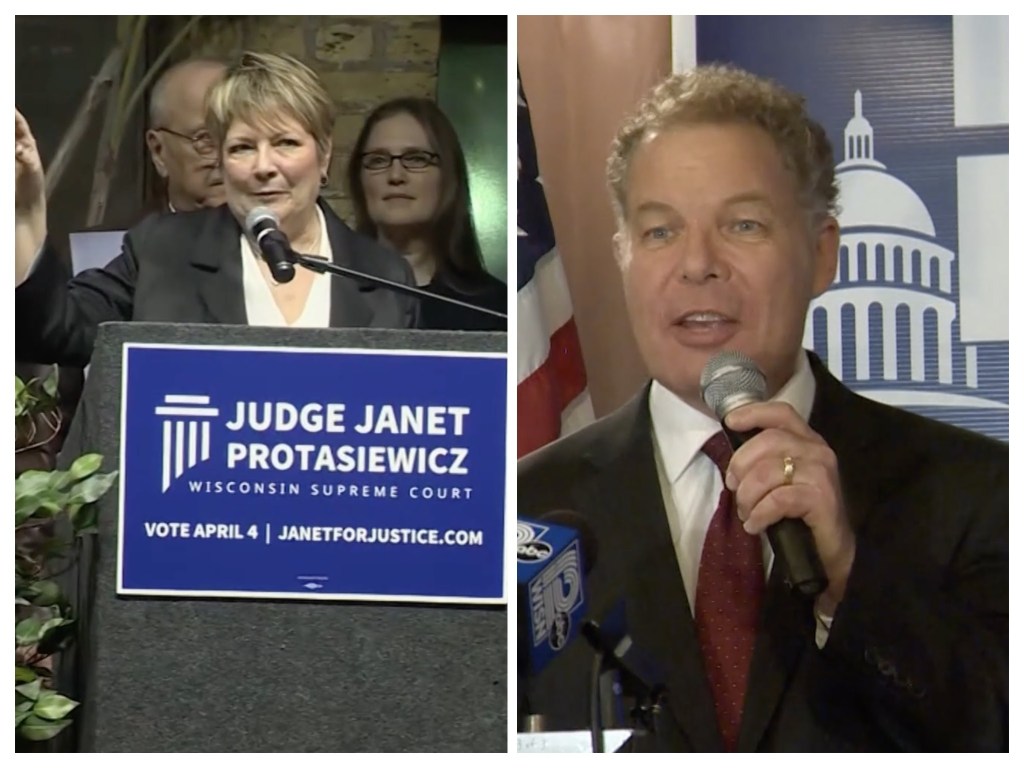Wisconsin’s April 4 election for a 10-year seat on the state’s supreme court is technically nonpartisan, but from the outside it’s hard to tell. Spending in the race is on track to shatter records, and the two candidates are trading barbs resembling those of any other election.
The race’s intensity comes as the state parties see the court as the referee between the GOP-controlled legislature and the Democratic-controlled governor’s mansion as they debate abortion, crime, and election integrity.
Wisconsin’s Democrats have rallied behind liberal Milwaukee County judge Janet Protasiewicz, while state Republicans have done the same for former state Supreme Court Justice Dan Kelly. Protasiewicz has criticized “rigged” state district maps and gone all in on defending abortion rights. Kelly has accused his opponent of being soft on crime, and, in line with the GOP’s strategy last November, sought to largely duck talking about abortion.
The contest to replace retiring Justice Patience Roggensack will swing the seven-member makeup of the Wisconsin Supreme Court: Conservatives have had the majority for the last decade, but a Protasiewicz win would give liberals a one-seat majority.
“With divided government here between the legislature on the one hand and a Democratic governor on the other, seeing the state Supreme Court as the ultimate arbiter of those conflicts, really is an example of the court becoming the referee between a Republican legislature and a Democratic governor,” pollster Charles Franklin, director of the Marquette Law School Poll, told The Dispatch.
Abortion tops campaign issues.
Protasiewicz has focused on clashes over Wisconsin’s abortion laws since the U.S. Supreme Court’s Dobbs decision sent abortion regulation back to the states.
Since then, an 1849 statute now outlaws abortion in all circumstances unless a woman’s life is at risk, prompting Planned Parenthood clinics in the state to stop offering abortions. Wisconsin Gov. Tony Evers and Attorney General Josh Kaul sued to challenge the 1849 abortion law, and their lawsuit could reach the state Supreme Court after the election.
“I value a woman’s freedom to make her own reproductive health care decisions with her doctor, family, and faith,” Protasiewicz has said about abortion, though she hasn’t explicitly indicated how she’d rule if the case came before the state Supreme Court. She’s gotten an endorsement from the abortion rights group Emily’s List, apparently the first time the group has endorsed in a state supreme court race.
Kelly has been less outspoken about his own views on abortion. “I don’t want to speak directly to it,” he told PBS, though he noted it’s the legislature’s job to change the 1849 law. He’s also won endorsements from three of the state’s major pro-life groups.
Kelly has characterized Protasiewicz’s position as “virtue signaling” and while saying his is one of judicial restraint: “If we do not resist this assault on our Constitution and our liberties, we will lose the Rule of Law, and will find ourselves saddled with the Rule of Janet.” He describes himself as a “judicial constitutionalist,” with an “unwavering commitment to the rule of law.”
Protasiewicz’s campaign matches tit for tat. “Wisconsinites deserve to know the court is making decisions based on the law and our constitution,” Protasiewicz campaign spokesperson Sam Roecker told The Dispatch. Protasiewicz “is the only candidate in the race who has talked about the need for recusal rules on the court and she has said she will recuse herself from cases where the Democratic Party of Wisconsin is a litigant. Dan Kelly does not support a recusal rule and would not rule out participating in cases brought by the Republican Party of Wisconsin.”
Crime is also dominating the campaign. Kelly’s endorsements page prominently highlights more than a dozen sheriffs who are supporting him. The state Republican Party also launched a “No Jail Janet” website accusing Protasiewicz of giving light sentences to criminals. Protasiewicz’s campaign, meanwhile, has cut ads highlighting Kelly’s own defense of particular clients while in private practice as an attorney.
Protasiewicz has campaigned on the issue of redistricting, though no active cases are headed for the state’s high court. Its conservative majority approved the current maps after the U.S. Supreme Court rejected a plan requiring the state to include a new majority-black district. The state court decided to use maps the GOP legislature approved, which Democrats have long claimed were gerrymandered. Kelly has said that he would not allow politics to influence him if a redistricting case came before the court.
Then there’s the question of election integrity, which Democrats have said could come into play in 2024. In 2020, Wisconsin’s Supreme Court voted 4-3 not to overturn Joe Biden’s narrow victory in the state, with one conservative justice siding with the three liberal justices to reject Donald Trump’s push to toss 200,000 votes from Democratic counties key to Biden’s win. Kelly has implicitly criticized Brian Hagedon, the justice who sided against Trump. He has refused to say whether the court made the right decision to rule against Trump’s claim, but also told the New York Times that he has “no reason to believe” Wisconsin’s 2020 election was improperly decided.
Feels like November.
If the contours of the Wisconsin’s Supreme Court race seem familiar, it’s because they are. State Republicans employed similar messaging on crime and public safety in November but got mixed results: GOP Sen. Ron Johnson kept his seat, but Democratic incumbent Tony Evers retained the governor’s mansion.
That and Protasiewicz’s performance in the February primary are encouraging Democrats.
“The issue environment has not changed since November. Voters are still motivated by the Dobbs decision,” Democratic strategist Joe Zepecki said. “[Kelly’s] only move is to try to make this about Janet’s declaration of her values, because he doesn’t have a leg to stand on—he’s not where the voters are.”
One potential boon for Republicans may be down ballot races. The crowd that turns out for such races will likely be older and more conservative, Republican campaign strategists told The Dispatch.
“We believe in the trickle-up effect, whereby if you put high quality candidates on the ballot, down ballot, you’re going to draw their friends and relatives who are coming out, essentially to vote for these local candidates, but will also wind up voting in the state Supreme Court race,” Former Lt. Gov. Rebecca Kleefisch, now president of the 1848 Project advocacy group, told The Dispatch. “We think that is going to be a very helpful phenomenon for Dan Kelly.”
Still, former GOP Rep. Reid Ribble of Wisconsin sounded a note of caution for Republicans.
“At the end of the day the base typically shows up on the left and the right here in Wisconsin, they’re almost evenly divided. So this race ends up getting decided by that independent, left-, and right-of-center voter in the middle,” Ribble said. “I think the real concern here is whether or not they’re gonna be so fed up with how vitriolic things have gotten that they just walk from it and don’t vote at all.”






Please note that we at The Dispatch hold ourselves, our work, and our commenters to a higher standard than other places on the internet. We welcome comments that foster genuine debate or discussion—including comments critical of us or our work—but responses that include ad hominem attacks on fellow Dispatch members or are intended to stoke fear and anger may be moderated.
With your membership, you only have the ability to comment on The Morning Dispatch articles. Consider upgrading to join the conversation everywhere.